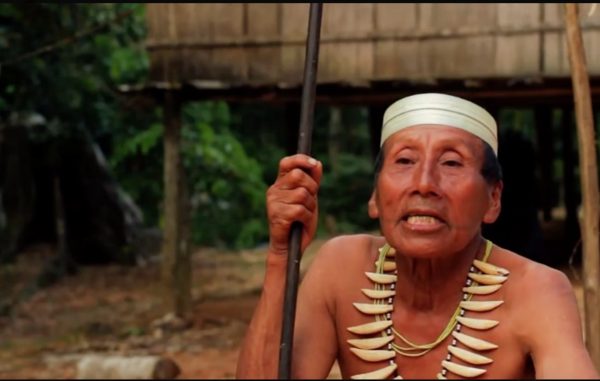
by Deep Green Resistance News Service | Mar 15, 2017 | Indigenous Autonomy, Lobbying
Featured image: Salomon Dunu, a Matsés man who survived the trauma of first contact, speaks to a Survival campaigner about the threat of oil exploration to his people. © Survival International
by Survival International
A Canadian oil company has told Survival International it will withdraw from the territory of several uncontacted tribes in the Amazon where it had been intending to explore for oil.
The company, Pacific E&P, had previously been awarded the right to explore for oil in a large area of the Amazon Uncontacted Frontier, a region of immense biodiversity which is home to more uncontacted tribes than anywhere else on Earth. It began its first phase of oil exploration in 2012.
The move follows years of campaigning by Survival International and several Peruvian indigenous organizations, including AIDESEP, ORPIO, and ORAU. ORPIO is suing the government over the threat of oil exploration.
Thousands of Survival supporters had protested by sending emails to the company’s CEO, lobbying the Peruvian government, and contacting the company through social media.
Survival also released an open letter, protesting against the threat of oil exploration, which was signed by Rainforest Foundation Norway and ORPIO. Sustained campaigning helped bring attention to the issue within Peru and around the world.
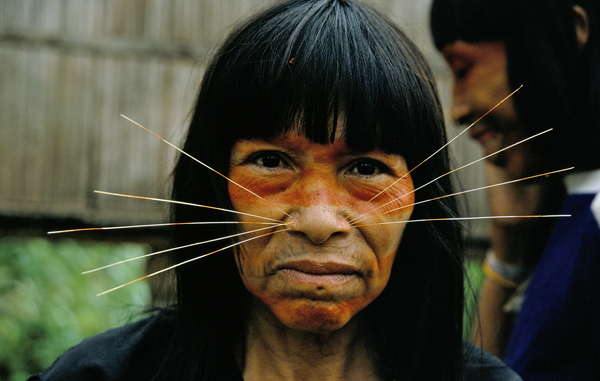
The Matsés have been dependent on and managed a large area of the Amazon Uncontacted Frontier for generations. © Christopher Pillitz
In a letter, Pacific E&P’s Institutional Relations and Sustainability Manager said that: “[The company] has made the decision to relinquish its exploration rights in Block 135… effective immediately… We wish to reiterate the company’s commitment to conduct its operations under the highest sustainability and human rights guidelines.”
At a tribal meeting in late 2016, a man from the Matsés tribe, which was forced into contact in the late 20th century, said: “I don’t want my children to be destroyed by oil and war. That’s why we’re defending ourselves… and why we Matsés have come together. The oil companies … are insulting us and we won’t stay silent as they exploit us on our homeland. If it’s necessary, we’ll die in the war against oil.”
Oil exploration involves sustained land invasion which can dramatically increase the risk of forced contact with uncontacted tribes. It leaves them vulnerable to violence from outsiders who steal their land and resources, and to diseases like flu and measles to which they have no resistance.
The announcement that it was not going ahead was welcomed by campaigners as significant in the fight to protect uncontacted peoples’ lives, lands and human rights.
Survival’s Director Stephen Corry said: “This is great news for the global campaign for uncontacted tribes and all those who wish to halt the genocide that has swept across the Americas since the arrival of Columbus. All uncontacted peoples face catastrophe unless their land is protected and we believe they are a vitally important part of humankind’s diversity and deserve their right to life to be upheld. We will continue to lead the fight to let them live.”
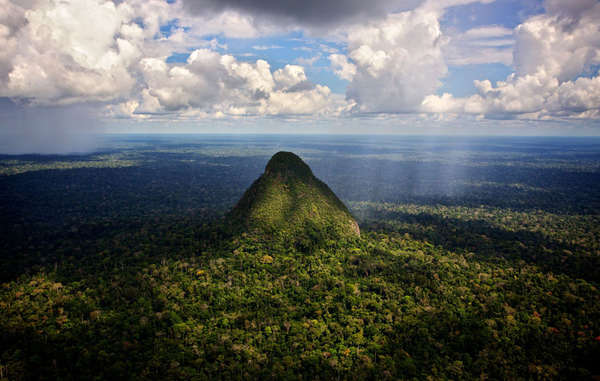
The region includes the Sierra del Divisor, or “Watershed Mountains,” a unique and highly biodiverse region known for its cone-shaped peaks. © Diego Perez
Background briefing
▪ Oil block 135 is within the proposed Yavarí Tapiche indigenous reserve. Peru’s national Indian organization AIDESEP has been calling for the creation of the reserve for over 14 years.
▪ Part of the oil concession is within the newly created Sierra del Divisor national park. The Peruvian government had awarded Pacific E&P rights to explore within the park.
▪ The Yavarí Tapiche region is part of the Amazon Uncontacted Frontier. This area straddles the borders of Peru and Brazil and is home to more uncontacted tribes than anywhere else in the world.
▪ Peru has ratified ILO 169, the international law for tribal peoples, which requires it to protect tribal land rights.
▪ We know very little about the uncontacted tribes in the area. Some are presumed to be Matsés, but there are other uncontacted nomadic peoples in the region.
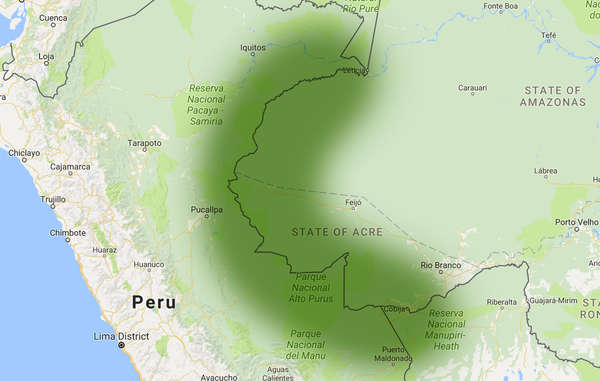
The Amazon Uncontacted Frontier, a large area on the Peru-Brazil border that is home to the highest concentration of uncontacted tribes in the world. © Survival International
Uncontacted tribes are not backward and primitive relics of a remote past. They are our contemporaries and a vitally important part of humankind’s diversity. Where their rights are respected, they continue to thrive.
Their knowledge is irreplaceable and has been developed over thousands of years. They are the best guardians of their environment. And evidence proves that tribal territories are the best barrier to deforestation.
All uncontacted tribal peoples face catastrophe unless their land is protected. Survival International is leading the global fight to secure their land for them, and to give them the chance to determine their own futures.
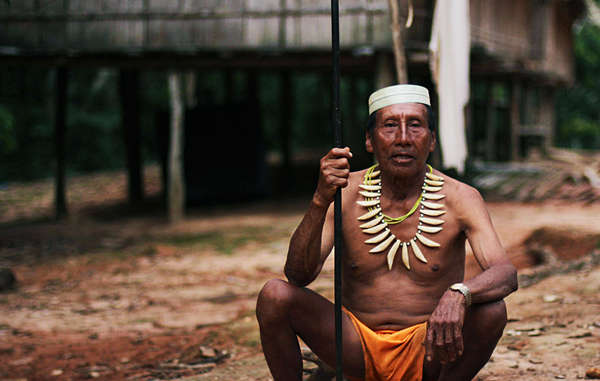
by Deep Green Resistance News Service | Mar 10, 2017 | Lobbying
Featured image: The Matsés have denounced oil exploration in the proposed Yavarí Tapiche reserve, which is part of their ancestral lands. © Survival International
by Survival International
In an open letter to the Peruvian authorities, Survival International, Rainforest Foundation Norway and Peruvian indigenous organization ORPIO have denounced the Peruvian government’s failure to protect uncontacted tribes.
The organizations are calling for the government to create an indigenous reserve, known as Yavari-Tapiche, for uncontacted tribes along the Peru-Brazil border, and to put a stop to outsiders entering the territory.
In the letter the three organizations state: “Uncontacted tribes are the most vulnerable peoples on the planet. They have made the decision to be isolated and this must be respected…
“The Yavarí Tapiche region is home to uncontacted peoples. Despite knowing of their existence and enormous vulnerability, the government has failed to guarantee their protection…
“These tribal peoples face catastrophe unless their land is protected. Only by creating the proposed Yavarí Tapiche indigenous reserve and implementing effective protection mechanisms that prevent the entry of outsiders, will the indigenous people be given the chance to determine their own futures…
“We are also concerned about the government’s refusal to exclude oil exploration within the proposed reserve…. No exploration or exploitation of oil should ever be carried out on territories inhabited by uncontacted Indians…
“We believe that the oil company Pacific Stratus is poised to begin operations this year in areas where there are uncontacted tribes…
“By failing to both create the reserve and to rule out oil exploration, Peru is violating both domestic and international law…
“If the government does not act urgently to protect the uncontacted peoples of Yavarí Tapiche, we fear that they will not survive. Another tribe will disappear from the face of the earth, before the eyes of the world.”
Survival’s Director Stephen Corry said: “We’ve repeatedly called for the Yavarí-Tapiche indigenous reserve to be created and for oil exploration to be ruled out, but the government has dragged its feet. The lives of uncontacted Indians are on the line but once again, economic interests take priority.”
Background Briefing
– The Yavarí Tapiche region is part of the Amazon Uncontacted Frontier. This area straddles the borders of Peru and Brazil and is home to more uncontacted tribes than anywhere else in the world.
– Pacific Stratus, part of Canadian oil company Pacific E&P, began its first phase of oil exploration in 2012, despite protests from indigenous organizations and Survival International. It is believed that the company will begin its second phase soon.
– Oil exploration is devastating for uncontacted tribes. Over 50% of the Nahua tribe died as a result of exploration in the 80s.
– The indigenous organization ORPIO is suing the government over the threat of oil exploration.
– National indigenous organization AIDESEP has been calling for the creation of the reserve for over 14 years.
by Deep Green Resistance News Service | Nov 22, 2016 | Strategy & Analysis
Trump’s election has sabotaged any prospect of reigning in the global warming crisis
by Max Wilbert / Deep Green Resistance
On Tuesday night, the American people decided to elect Donald J. Trump, a billionaire business mogul and reality TV star who has been accused of raping or otherwise sexually assaulting twenty-three women, who has called for banning immigration to the United States, and who has built a campaign on virulent racism.
He received more than 60 million votes.
There is a lot to process. Those conversations, about the growing tide of white supremacy, about Trump’s pending sexual assault cases, about the fact that Hillary Clinton won the popular vote, about the left’s failure to engage with the white community on issues of race, and about the gerrymandering and voter disenfranchisement that characterizes the American system, are already taking place.
I want to focus here on one specific issue: global warming. As I’m writing this, I’m sitting in the sun outside my home. It’s November, and temperatures are more than 20 degrees above the typical average here. This year, 2016, is predicted to be the hottest year on record, beating out last year, which beat out the previous year, which beat out the previous year, each of the last five setting a new mark.
Records are being smashed aside like bowling pins. We are in the midst of a global catastrophe, and it is even worse than previously thought. On the day after the election, news broke that the climate is more sensitive to global warming than most calculations had suspected.
The study in question predicted nearly double the warming that the Intergovernmental Panel on Climate Change (IPCC) had previously expected. The new data predicts between 9 and 14 °F warming by 2100, enough to potentially lead to the extinction of the human species and flip the Earth into a completely new regime more similar to Venus than Earth. Michael Mann, one of the most well-known climate scientists in the world, says these findings and the changing political situation may mean “game over for the climate.”
Into this mess strides Donald Trump, who has said that if elected, he would “immediately approve” the Keystone XL pipeline, roll back environmental regulations, further subsidize the fossil fuel industry, and back out of the Paris climate agreement. Coal and oil stocks, as well as shares of equipment companies and railroads, jumped in price after news of his victory hit.
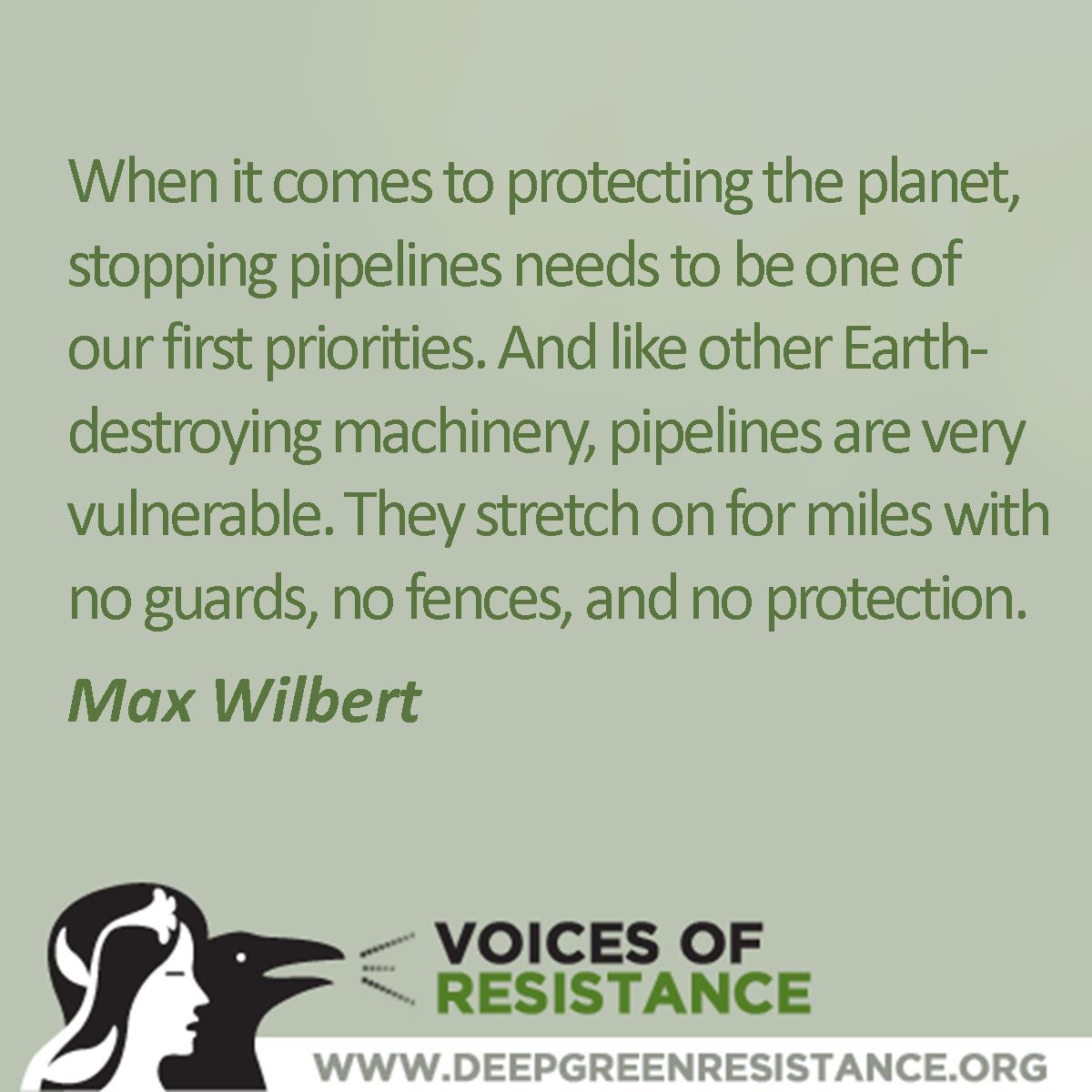 Right now, thousands of native people and allies are gathering on the cold plains of North Dakota in an attempt to stop the Dakota Access Pipeline. Under President Obama, such popular movements had a chance—a small chance, but a chance—of success. Under Trump, there won’t be so much leniency, and the road to victory will be much harder.
Right now, thousands of native people and allies are gathering on the cold plains of North Dakota in an attempt to stop the Dakota Access Pipeline. Under President Obama, such popular movements had a chance—a small chance, but a chance—of success. Under Trump, there won’t be so much leniency, and the road to victory will be much harder.
History is clear; social movements have generally flourished under slightly more progressive administrations, and waned under right wing leadership. What does this mean for our strategy?
I would like to have a peaceful transition to a sane and sustainable world, but it seems increasingly impossible. The American people have shown themselves to be a reactionary force, clinging to their privilege as if it can shield them against the arrows that originate in American foreign policy. Immigrants come here because their lands have been destroyed for American capitalism, and groups like ISIS have emerged from a slurry of war, oil, racism, and fundamentalism.
Perhaps, then, we need a different type of change. When it comes to protecting the planet, stopping pipelines needs to be one of our first priorities. And like other Earth-destroying machinery, pipelines are very vulnerable. They stretch on for miles with no guards, no fences, and no protection.
Recently, a number of activists, including some who I know, were able to approach and shut down all five pipelines that carry tar sands oil into the United States in a coordinated act of non-violent civil disobedience. Their action was brave, but its long-term efficacy depends on whether courts will agree with them that their action was necessary and create a precedent to normalize actions of this type. With another Antonin Scalia on the way to the Supreme Court, a positive outcome is in doubt.
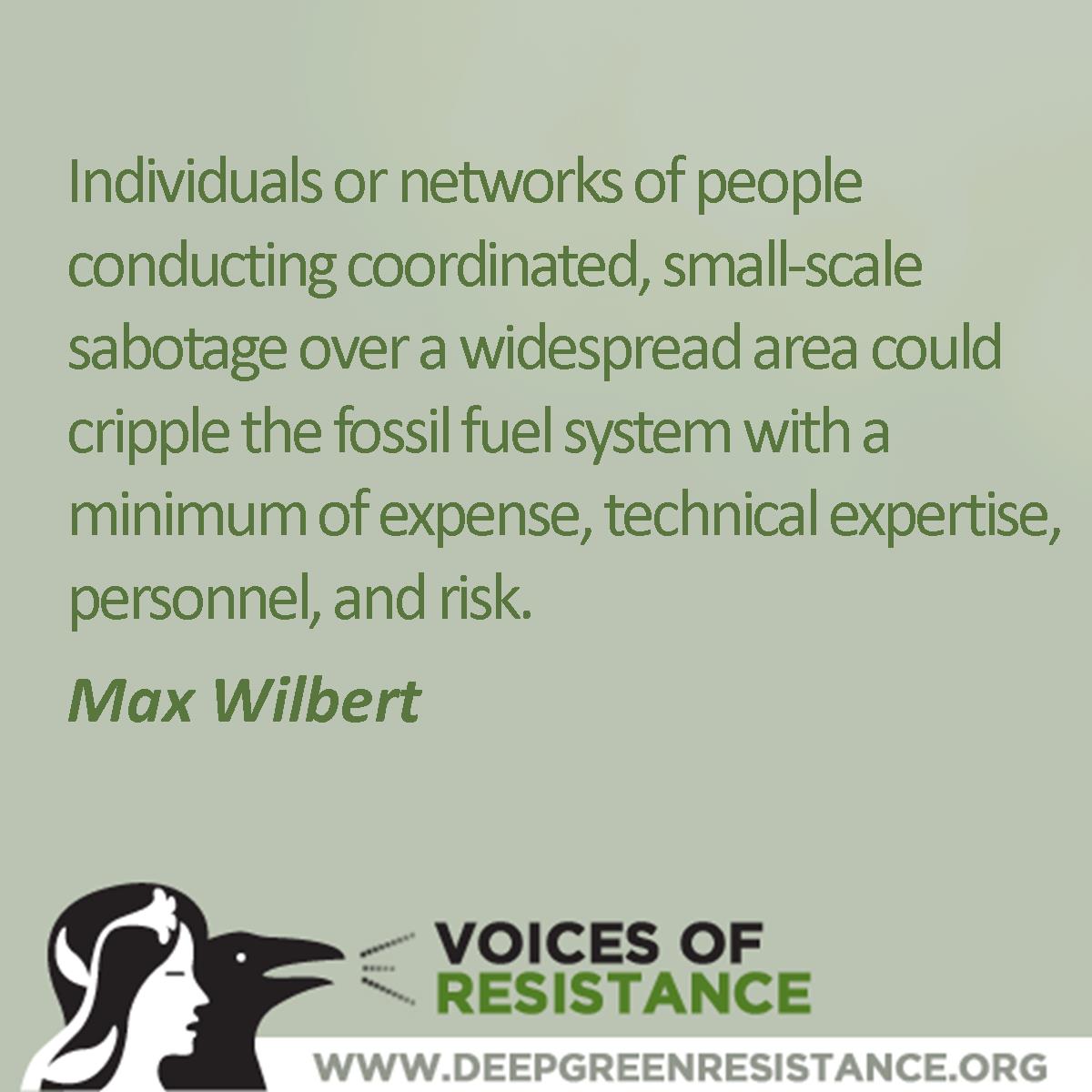 Coordinated action of another type could be more effective in protecting the planet. In plain language, I speak of sabotage. Individuals or networks of people conducting coordinated, small-scale sabotage over a widespread area could cripple the fossil fuel system with a minimum of expense, technical expertise, personnel, and risk. It is simple to disappear into the night, and with proper security culture the possibility of capture is remote. We’ve seen how vulnerable this network is; anyone could do this.
Coordinated action of another type could be more effective in protecting the planet. In plain language, I speak of sabotage. Individuals or networks of people conducting coordinated, small-scale sabotage over a widespread area could cripple the fossil fuel system with a minimum of expense, technical expertise, personnel, and risk. It is simple to disappear into the night, and with proper security culture the possibility of capture is remote. We’ve seen how vulnerable this network is; anyone could do this.
It isn’t idle speculation that such attacks would have a substantial impact. Its actually been done before, most notably in Nigeria, where indigenous people in the Niger River Delta have risen against polluting oil companies many times over the past several decades. Most recently, attacks on oil pipelines earlier this year shut down some 40 percent of Nigeria’s oil processing. Months later, the oil industry still hasn’t recovered.
To many people, this plan will sound insane. Modern life is dependent upon oil in so many ways. But when oil is killing the planet and those in power will not respond to rational argumentation or peaceful protest, and when sixty million people are willing to vote a climate-denying sexual abuser into office, what options are we left with? It is time for serious escalation.
Max Wilbert is a writer, activist, and organizer with the group Deep Green Resistance. He lives on occupied Kalapuya Territory in Oregon.
To repost this or other DGR original writings, please contact newsservice@deepgreenresistance.org
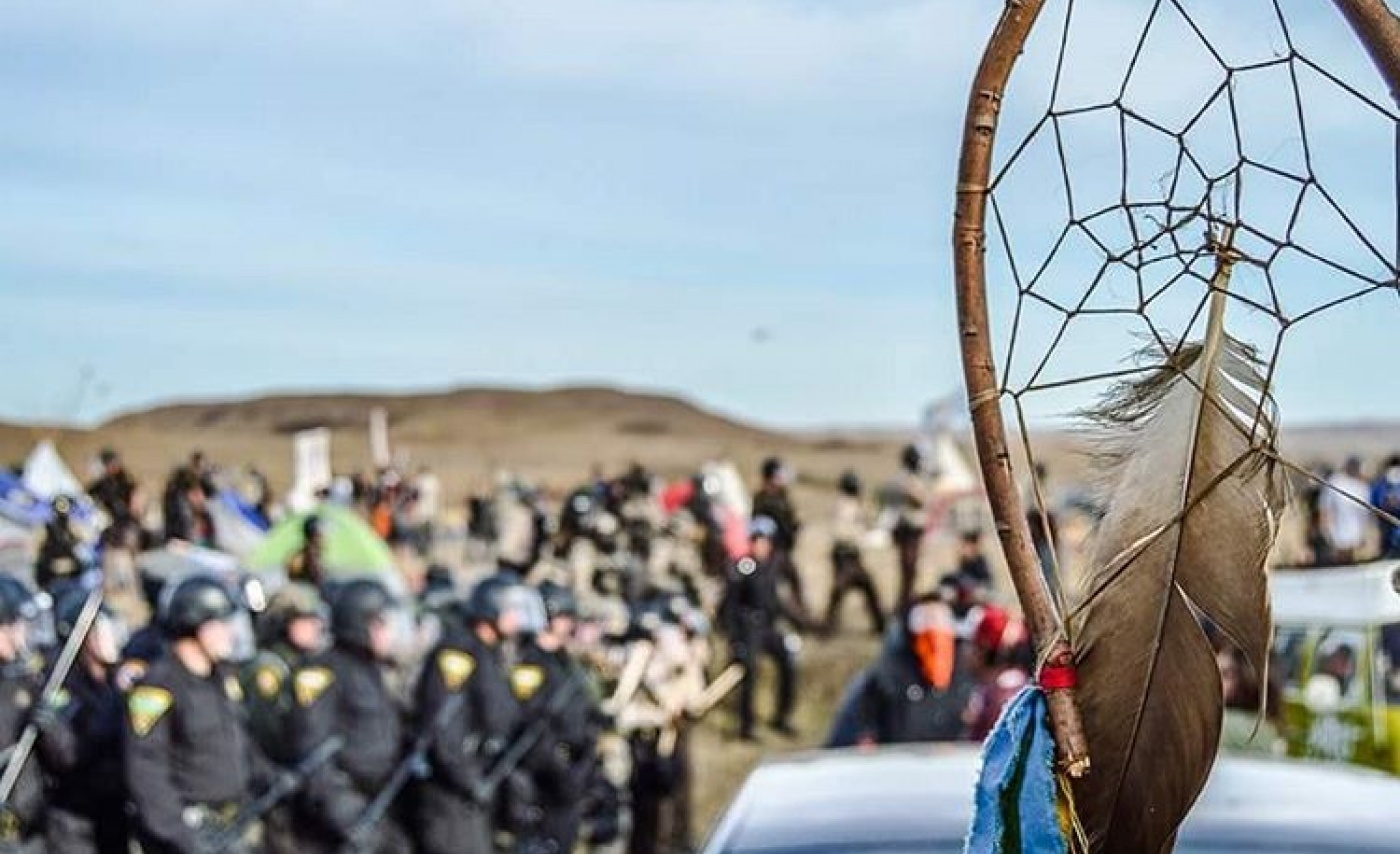
by Deep Green Resistance News Service | Nov 14, 2016 | Lobbying
by Cultural Survival
“We call upon all member states, to condemn the destruction of our sacred places and to support our nation’s efforts to ensure that our sovereign rights are respected. We ask that you call upon all parties to stop the construction of the Dakota Access pipeline and to protect the environment, our nation’s future, our culture and our way of life.”
– Standing Rock Sioux Tribe Chairman Dave Archambault II
The International Indigenous Peoples`Forum on Climate Change (IIPFCC) condemns the construction of the Dakota Access pipeline and stands in solidarity with our sisters and brothers of the Standing Rock Sioux Tribe and all Water Protectors in opposition to this project.
Human Rights and the Indigenous Rights Perspective
The Dakota Access pipeline is being built on the un-ceded treaty lands of the Standing Rock Sioux Tribe, without their free, prior and informed consent, as is described in the UN Declaration on the Rights of Indigenous Peoples in Articles 18, 19, and 32. The pipeline is also being constructed through sacred areas and ancestral burial grounds of the Standing Rock Sioux and other Indigenous Peoples of the area. This massive construction project does not respect the Standing Rock Sioux’s Treaty rights, sovereignty, or their right to self-determination. It is an outright violation of their rights over their lands and resources as Indigenous Peoples, and does not respect the human rights of Indigenous Peoples.
Climate Perspective
The Dakota Access pipeline will transport 470 000 – 570 000 barrels of oil every day, which will release emissions of 101,4 million tonnes CO2, as much as 30 American coal power plants, every year. This is not consistent with the State Parties’ obligations and commitments under the Paris Agreement or the Sustainable Development Goals (SDGs). The continued production of fossil fuels only assures that global temperature will rise well above 2°C in the immediate future and threaten the lives and livelihoods of Indigenous Peoples around the world. The potential for a major oil spill from the Dakota Access pipeline is immediate. The pipeline is scheduled to cross underneath the Missouri River, which is the main source for drinking water for the Standing Rock Sioux Reservation and for millions of people who live downstream. Sunoco Logistics, the operating company of the pipeline, alone has experienced over 200 oil spills in 6 years, and the US had in total over 3300 leaks since 2010, polluting rivers, ground waters, land and air, and both human lives, health and livelihoods has been lost.
The IIPFCC calls upon the US to halt the construction of the Dakota Access pipeline and to enter into serious consultations with the Standing Rock Sioux, and other tribes affected by this project, respecting the right of the Tribes to free, prior and informed consent.
The state owned Norwegian Oil Fund is heavily invested in the pipeline. The IIPFCC calls upon Norway to divest from the Dakota Access pipeline Project.
We also call on all States to ensure the protection of Indigenous Peoples´ territories across the world as a critical action in the implementation of the Paris Agreement and in achieving the SDGs.
Featured image by A. Golden/Flickr.
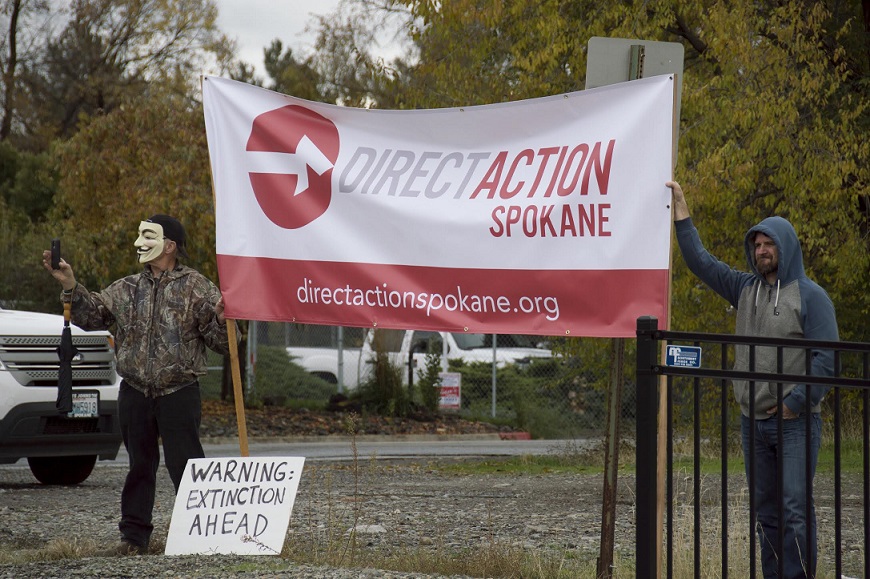
by Deep Green Resistance News Service | Nov 3, 2016 | Obstruction & Occupation
by Nic Bowcut / Direct Action Spokane
SPOKANE- An estimated 50 individuals braved cooling temperatures and the threat of arrest to show their support for stopping the transportation of coal and oil by rail in Spokane, WA. The rally, drawing individuals from as far away as Montana, highlighted the growing resentment toward large corporation’s desire to use rail systems to transport potential dangerous materials across the country, along with the hazardous and potentially lethal precedent set in the continued use of fossil fuels.
Thomas Schmidt, a local activist, stated: “I know that our culture, based on consumerism, economic exploitation, material accumulation and profit, is exhausting our natural and human resources. Therefore I have decided I must nonviolently take direct action, placing my body in the way to stop their behavior and sincerely to engage them or whoever else will pay attention.”
Schmidt, along with others, stood tall, facing potential arrest as they blocked the rail way. Police from both the United Pacific and Burlington Northern Rail companies arrived roughly ten minutes into the rally. In the end, no arrests were made.
This rally was just one of a growing number nationwide, especially in the Pacific Northwest, drawing attention to an issue that has seen opposition growing on two fronts: public safety and environmental exploitation.
The rally was highlighted by several speakers, including Standing Rock protester Rusty Nelson, Spokane artist and activist Jacob Johns, Dr. Gunnar Holmquist, and “Raging Granny” and recent coal and oil train blockade arrestee Margie Heller.







 Coordinated action of another type could be more effective in protecting the planet. In plain language, I speak of sabotage. Individuals or networks of people conducting coordinated, small-scale sabotage over a widespread area could cripple the fossil fuel system with a minimum of expense, technical expertise, personnel, and risk. It is simple to disappear into the night, and with
Coordinated action of another type could be more effective in protecting the planet. In plain language, I speak of sabotage. Individuals or networks of people conducting coordinated, small-scale sabotage over a widespread area could cripple the fossil fuel system with a minimum of expense, technical expertise, personnel, and risk. It is simple to disappear into the night, and with 
